- October 10, 2017
- By Chris Carroll
When people hoist signs and raise their voices, it’s a cue for sociology Professor Dana Fisher to start collecting data.
A leading researcher of the motivations and dynamics of mass street protests, Fisher says the United States is in the midst of a historic surge of civil dissent: “We’re seeing an amazing revitalization of American democracy, with people engaging in politics in a way I haven’t seen before in my lifetime.”
This fall, chapters from her upcoming book, “American Resistance,” due in 2019 from Columbia University Press, are going live. She took time out from writing to talk about some of the biggest street protests of recent years.
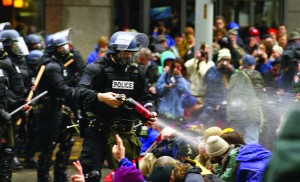 1999 Seattle WTO Protest
1999 Seattle WTO Protest
The so-called “Battle in Seattle,” including tens of thousands of peaceful activists decrying globalization and pockets of violent anarchists, foreshadowed bigger protests in the new millennium.
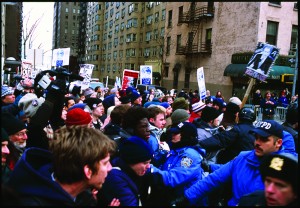 2003 Feb. 15 Iraq War Protest
2003 Feb. 15 Iraq War Protest
As many as 1 million people turned out in New York City to protest the impending war in Iraq, while sister marches took place globally. Crowd control measures were notably aggressive, Fisher says, and the city paid settlements to protestors who charged that police had violated their rights.
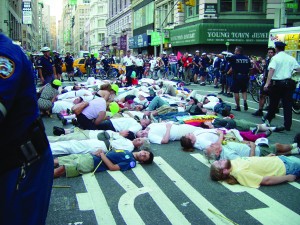 2004 Republican National Convention
2004 Republican National Convention
Fisher’s data from the NYC event showed many marchers were protesting the Patriot Act, which upped surveillance authorities and broadened the definition of terrorism. Police, meanwhile, were accused of preemptively targeting marchers.
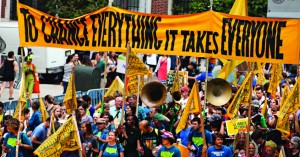 2014 People’s Climate March
2014 People’s Climate March
The single biggest anti-global warming march ever, with 311,000 or more in NYC alone, heralded the arrival of climate change as a mainstream U.S. concern, Fisher says.
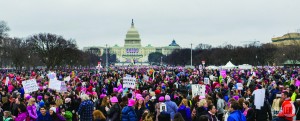 2017 Women’s March
2017 Women’s March
The era of protest kicked into high gear in Washington, D.C., a day after President Donald Trump’s inauguration—the first of several big marches this year. Women’s issues were front and center, Fisher says, “but the degree to which there was a wide swath of progressive issues, including the environment and immigrants’ rights, was noteworthy.”
Photos Courtesy of South Bend Voice via Flickr, Jonathan Mcintosh, Steve Kaiser via Flickr, Alejandro Alvarez, Alex Wright, and Mark Dixon
